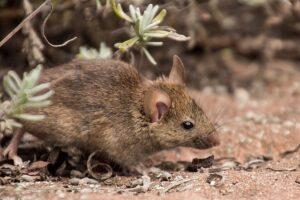Displacing the voles and the invasive plant is a challenge at the same time
In the last hundred years, February and March have been like this three times, as far as heat and warm weather are concerned. This unusual weather means for the plants that they cannot adapt to the conditions as they are genetically used to or bred for in the temperate climate zone – this is especially true for autumn-sown plants. Therefore, this extreme weather brings with it a series of problems from the point of view of plant health and physiology, for which we are not prepared. This is also true for farmers, since they do not have long-term forecasts with which to adapt to the circumstances. According to Csaba Imre Hubai, herbalist, organic farmer, and president of the Jász-Nagykun-Szolnok County of the National Chamber of Agrarian Economy, the professional background and forward thinking are indispensable in the next period as well.

(Photo: Pixabay)
One day it’s freezing, the next day it’s a temperature rising above twenty degrees: the human body is better able to adapt to this stress effect, but the vegetation is less so, because it’s tied to one place. In recent decades, the state of the genetically formed plant cannot follow the conditions like us, humans. For this reason, farmers must constantly monitor soil and climate factors in order to adapt. And then we haven’t even talked about plant exposure: weeds, pests and diseases. According to Imre Hubai, “if the weather conditions are favorable for these factors, the farmer must take the necessary steps in time, for example with nutrients, as well as the application of plant protection options. This requires well-trained specialists, as well as the forecast they use, and herbalists must use the most suitable and cheapest preparations”.
What really makes life miserable for farmers are voles
At the end of the summer, an almost unmanageable situation developed in the country, moreover, they overwintered due to the mild winter, so they were not affected by any stress that would have reversed the gradation. Therefore, it is still necessary to take into account that this pest is present, will multiply and will cause great damage. It is possible to accustom the birds of prey to the area, and chemical control must be applied.
Although the plants are stationary, invasive plants are coming to our country from a completely different area due to climate change
They also began to migrate from the Mediterranean climate to the temperate zone. The question arises as to whether it is possible to select varieties from among these cultivated plants that adapt to these conditions. – Invasive plants really cause a big problem, because they find conditions here like in the south due to the climate. Therefore, agrotechnical methods must be chosen that suppress invasive plants, and on the other hand, cultivated plants must be planted when the invasive plants have been eradicated before, or when we can protect against them during the year. This is not only a big challenge from a plant protection point of view, but also for us, because they bring with them pollens that we are not prepared for, so the role of the plant doctor and the farmer becomes stronger, because we have to be prepared to protect against weeds – said Imre Hubai.
novenyvedoszer.hu
Related news
State compensation for the victims of Bászna Gabona Zrt. has been completed
🎧 Hallgasd a cikket: Lejátszás Szünet Folytatás Leállítás Nyelv: Auto…
Read more >József Viski: Adaptation and competitiveness are key for the horticultural sector
🎧 Hallgasd a cikket: Lejátszás Szünet Folytatás Leállítás Nyelv: Auto…
Read more >Related news
How does the forint exchange rate affect consumer prices?
🎧 Hallgasd a cikket: Lejátszás Szünet Folytatás Leállítás Nyelv: Auto…
Read more >









